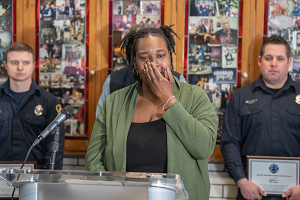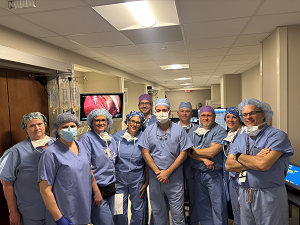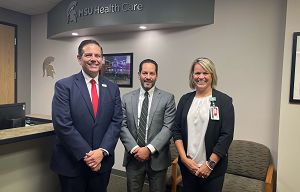Enrollment begins at Henry Ford Health System in first large-scale US study on Hydroxychloroquine’s Prevention of COVID-19

DETROIT – Enrollment began today at Henry Ford Hospital for the first large-scale study in the United States of the effectiveness of an anti-malarial drug in preventing COVID-19 in healthcare workers and first responders who volunteer to participate.
The “Will Hydroxychloroquine Impede or Prevent COVID-19,” or WHIP COVID-19, study is a 3,000-subject look at whether hydroxychloroquine prevents front-line workers from contracting the COVID-19 virus. This is a randomized, double-blinded study designed to produce a scientific answer to the question: Does it work? Preliminary results are expected in about four months. Currently, there are no FDA-approved preventions, vaccines or treatments for the COVID-19 virus.
“To produce relevant results, a study like this needs to be conducted in a geographic area with active COVID-19,” Dr. Steven Kalkanis, CEO of the Henry Ford Medical Group and Senior Vice President and Chief Academic Officer for Henry Ford Health System. “Unfortunately, we’re now a hot spot in the United States. But Detroit has always been the comeback city. Detroit turned car factories into tank factories and won World War II. Detroit stands for resilience. Detroit will lead the country in our war against COVID-19. Our hospital workers and first responders are heroes, reporting to duty every day in spite of COVID-19. And while this is only a study of an unproven medication – there are no proven cures or preventative treatments for COVID-19 – we owe it to them to look for ways to protect them.”
Henry Ford Health System, as one of the region’s major academic medical centers with more than $100 million in annual research funding, is already involved in numerous COVID-19 trials with partners around the world. Currently, there are more than 25 studies either underway or being reviewed at Henry Ford Health System in the quest to treat or prevent COVID-19.
“Given our broad clinical trials and translational research infrastructure, we are grateful to bring this type of large-scale effort to the COVID-19 battle,” said Dr. Marcus Zervos, division head of Infectious Disease for Henry Ford Health System.
Participation in the Whip COVID-19 study is strictly on a volunteer basis and limited to healthcare workers and first responders in southeast Michigan. Dr. Zervos will oversee this study with Dr. William W. O’Neill, a world-renowned interventional cardiologist and researcher who has pioneered multiple treatments for heart disease. For the Whip COVID-19 study, the FDA will provide the drug directly to Henry Ford Health System physicians to distribute. More information on participation can be found at www.HenryFord.com/whipCOVID19.
Both healthcare workers and first responders will be enrolled at Henry Ford Hospital Detroit. Any hospital healthcare worker within the Metro Detroit area will be able to volunteer to participate, including those from the Detroit COVID Consortium, a recently announced healthcare collaboration on COVID-19 research that includes Henry Ford Health System, Ascension, DMC, Wayne State University and Beaumont. Both health care workers and first responders will be enrolled at Henry Ford Hospital Detroit. Dr. O’Neill recently organized the group to efficiently coordinate and disseminate information about large-scale studies of COVID-19 treatments – and bring those measures to healthcare workers sooner.
Requirements to volunteer for the Whip COVID-19 study include:
- Badged employee of a southeast Michigan hospital system
- Badged City of Detroit first responders
- Badged bus drivers of the Detroit Department of Transportation
- Age between 18-75
- Not currently exhibiting COVID-19 symptoms
- Never previously diagnosed with COVID-19
- No significant heart or retinal disease
- No one who is pregnant or nursing
Due to limited enrollment capacity, not everyone who applies will be able to be enrolled in the study. Study coordinators will be in contact directly with those accepted to schedule an initial enrollment visit. Once volunteers provide a blood sample, the study subjects will receive vials with unidentified, specific pills to take over the next eight weeks: a once-a-week dose of hydroxychloroquine, a once-a-day dose, or a placebo (a pill that looks like the medication, but does not contain any medication or other active ingredients). The study medication was specially procured for this study and will not impact the supply of medication for people who already take the medication for other conditions.
Participants will not know what group they are in. They will then be contacted weekly and in person at week four and week eight of the study to see if they are exhibiting any symptoms of COVID-19, including dry cough, fever or breathing issues, as well as any medication side effects. At eight weeks, they will be checked again for symptoms, medication side effects, and have blood drawn. Results will be compared among the three groups to see if the medication had any effect.
“Whether this medication works or not, having those results produced in a scientific manner moves us toward the goal of knowing how to protect our frontline workers,” said Dr. O’Neill. “Given our broad clinical trials and translational research infrastructure, we are grateful to bring this type of large-scale effort to the COVID-19 battle.”
According to the U.S. Centers for Disease Control & Prevention, hydroxychloroquine (also known as hydroxychloroquine sulfate) is a U.S. Food & Drug Administration (FDA)-approved arthritis medicine that also can be used to prevent or treat malaria. It is available in the United States by prescription only. The drug is sold under the brand name Plaquenil and it is also sold as a generic medicine. It is commonly used by patients with arthritis, lupus or other rheumatic conditions.
Currently, there are no FDA-approved therapies to prevent or treat COVID-19. Hydroxychloroquine has been associated most recently with off-label or study-based use to either:
- Treat the Sick: symptomatic patients who test positive for COVID-19
- Prevent people from getting sick: Prescribed prophylactically to prevent healthy people from contracting COVID-19
Henry Ford Health System doctors are currently prescribing hydroxychloroquine as an off-label treatment for only sick, hospitalized, COVID-19-positive patients. Patients must meet specific criteria as outlined by the hospital system’s Division of Infectious Diseases. As required by the state of Michigan’s Department of Licensing and Regulatory Affairs (LARA), the physicians are documenting the prescribed use in the patient’s electronic medical record.
The FDA recently issued an Emergency Use Authorization to allow hydroxychloroquine sulfate and chloroquine phosphate products donated to the Strategic National Stockpile (SNS) to be distributed and prescribed by doctors to hospitalized teen and adult patients with COVID-19, as appropriate, when a clinical trial is not available or feasible.
More information can be found on the U.S. Department of Health & Human Services website.
In addition to using hydrochloroquine as deemed appropriate, Henry Ford is involved in numerous other trials with partners around the world to treat patients with COVID-19.
Dr. Manny Rivers is leading Henry Ford Health System’s involvement in a multi-center, prospective observational study designed to collect comprehensive data on hospitalized patients with COVID-19. The study will gather imaging, biospecimens, and long-term outcome data.
Henry Ford Health System is also participating in two Gilead Phase 3 clinical studies to evaluate the safety and efficacy of remdesivir in adults diagnosed with COVID-19. These are randomized, open-label, multicenter studies.
The first study will evaluate the safety and efficacy of both a 5-day and a 10-day dosing duration of remdesivir, for patients with severe manifestations of COVID-19. The second study will evaluate the safety and efficacy of the same dosing regimens of remdesivir in addition to standard of care for patients with moderate manifestations of COVID-19, compared with standard of care alone.
Dr. Indira Brar, an Infectious Diseases specialist at Henry Ford Hospital, is the Principal Investigator for both trials and is leading the recruitment and randomization of patients participating in the trials.
Remdesivir was originally developed a decade ago to treat Ebola and later research showed that Remdesivir shows potent in vitro activity against other human pathogenic coronaviruses, Middle East Respiratory Syndrome (MERS)-CoV and SARS-CoV.
###
MEDIA CONTACT: Tammy Battaglia / Henry Ford Health System / Tbattag1@hfhs.org / 248-881-0809
.svg?iar=0&hash=F6049510E33E4E6D8196C26CCC0A64A4)

/hfh-logo-main--white.svg?iar=0&hash=ED491CBFADFB7670FAE94559C98D7798)









